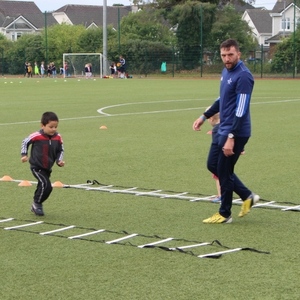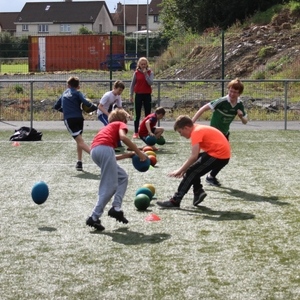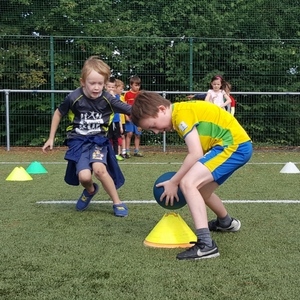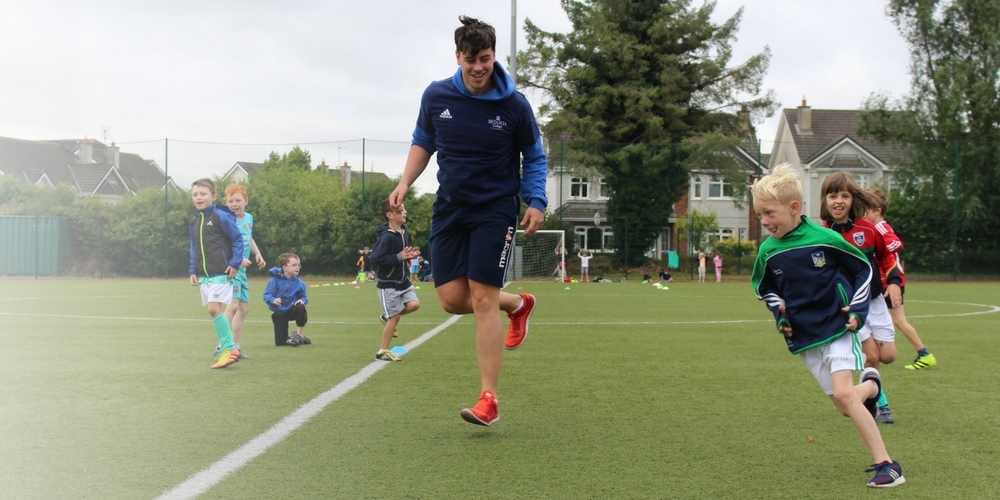In this blog, Darragh Kennedy looks at the health benefits of exercises, why fundamental movement skills are important and provide some tips and resources to help coaches, teachers and parents who may feel they need a little help or a nudge in the right direction.
When we are involved in sports coaching, we are often too focused on developing the next Olympic Champion or International Soccer Player, and can often forget about the role that sport has within society and its health benefits. If you are coaching your local Under 8 team, the likelihood is that none or very few of that team will go on to play at the top level. The majority may play until their teens and then we will see a drop off in participation, some players may not engage in any sports or physical activities during adulthood. The reasons are many, but one of the key areas that affect this is how the development of fundamental movement skills as a child can have an impact on participation levels, both at a young age, and later in life.

S&C Graduate Evan Hennessy teaching key functional movements at our Annacotty Summer Camp.
Health Risks & Obesity
With the rise in childhood and adult obesity levels over the past few decades in Ireland, it is clear that exercise has a role to play in preventing or tackling this issue. Childhood obesity is linked to a higher risk of medical conditions such as asthma, eczema and type 2 diabetes. And what people may not know is that obesity is also associated with psychological issues such as increased chances of being bullied or carrying out bullying, along with behavioural issues, suffering from depression and other emotional problems.
While there are many causes of obesity, we must acknowledge that there are other elements outside lifestyle habits that can lead to being overweight. But definitely there is a significant role for physical activity to play. We must look at ways to the expend the energy that we have taken in through our diets, as often the energy taken in exceeds daily requirements, leading to the storage of fat throughout the body.
Losing Interest
One reason why kids may give up or lose interest in sport could be due to a lack of development of fundamental movement skills. This is because they do not enjoy the sports anymore as they are not physically competent and cannot execute the skills to the required level. If they cannot adequately perform basic movements such as squatting, jumping, hopping or throwing, they do not have the foundation to perform more sports specific tasks in a competitive environment. They lose any enjoyment and fun that was there.

Demonstration on developing key skills at our Garryowen Summer Camp.
Better Coaching
To give children the best opportunity to develop these skills, there is a need for qualified coaches to deliver programs that focus on this area. A simple example would be whereby a child is having issues performing the roll lift in hurling or camogie. This is a sports specific skill that is taught at a young age so it makes perfect sense to incorporate some fundamental movement training in with the skills training. One issue that could be hindering the child is poor mobility around the hips and ankles, therefore preventing them from bending down sufficiently before they roll the hurley over the ball. A coach with a background in movement skills development may take that player and see how they perform a basic squat. Looking for any mobility restrictions, they may identify an area to be addressed, such as calf tightness, an issue that commonly limits squat depth. By addressing this tightness over a period of time, the player could then bend lower and perform the roll lift easier, meaning that the skills coach and player are not frustrated with a lack of progress in this skill.
Fun and challenging tasks are key elements of any children’s sports training programs. Improving movement competency and learning new skills are essential to maintaining interest and participation in youth sports. A lack of learning and skill development is a leading cause of dropout as the children are not challenged enough or also not competent enough to meet the movement demands of the sport. And we must also realise that developing the fundamental movement skills can have a positive transfer to sports specific skills. For example, studies have shown that physical education interventions that focus on basic movements such as a throw, leads to better sports specific performance in tasks such as javelin throw or a tennis serve, as opposed to just regular physical education classes.
School Intervention
Quite often the coach or teacher may not feel comfortable or equipped to teach or analyse these movement skills, not have enough time or appropriate facilities, or may just think that less structured programs that mainly incorporate free play are sufficient for physical development. And this is where there needs to be changes made. Within the school system there are positive changes being made, such as more of an emphasis on PE in primary schools, through the development and roll out of teacher training and resources under the Move Well, Move Often program. Also, the Government plans to introduce PE as a Leaving Certificate subject in the future. So, we are seeing a shift in policy and attitude towards physical activity being promoted at a national level. This will hopefully lead to increased participation levels through improved development of fundamental movement skills and also through the implementation of physical education as an examinable subject.

Children engaging in functional movement activities at our Garryowen Summer Camp.
What you can do
But while we must wait for these programs to be implemented, and real change does take time, we must take control over what we are responsible for. If you are a coach who feels you need help in addressing movement skills, why not speak or engage with your local PE teacher for any tips and advice. Why not think outside the box and speak with coaches who are involved in a variety of sports that you have little knowledge or experience of. If you coach soccer, look at what your local basketball or rugby coach does – the reason being the movement skills are generally the same, you just might find a bit of new material to use. Why not look at what your local athletics coach does in terms of teaching running mechanics or a gymnastics instructor does to teach balance, all key fundamental skills. Having a network of coaches can greatly improve your knowledge base and give you the opportunity to run ideas by.
Most of the major sporting bodies in Ireland will also have resources available online to help parents and coaches with drills and practice plans for developing movement skills. For example, the GAA has a lot of info through their Learning GAA website and the IRFU has information available on their Long Term Player Development pathway. And also most of these bodies will have coaching courses available to club members, where Fundamental Movement Skill development is included.
In summary, we see the need and benefit of incorporating movement skills development at a young age. But for some coaches it may seem a daunting task. With proper guidance through education and the availability of more skilled coaches, these barriers can be overcome.


Leave A Comment